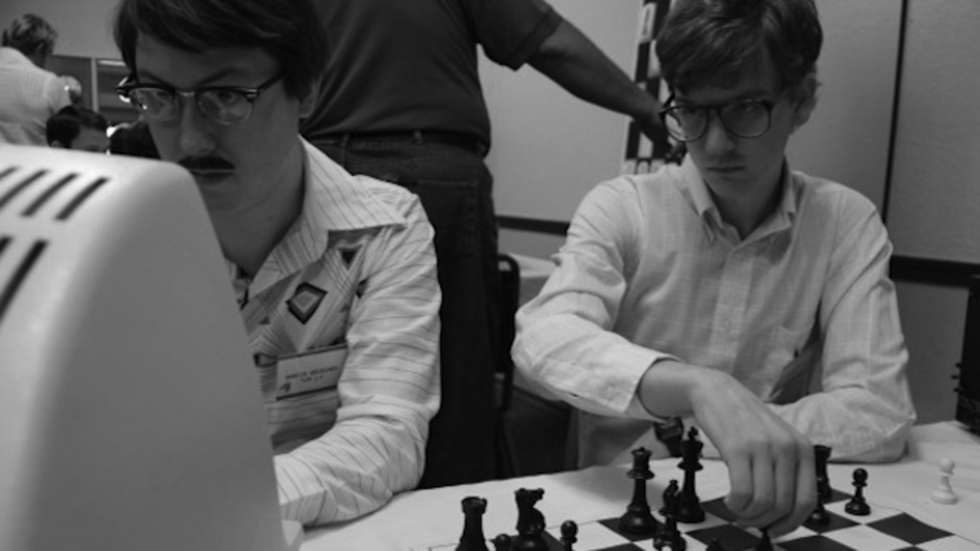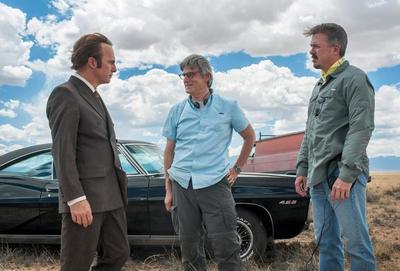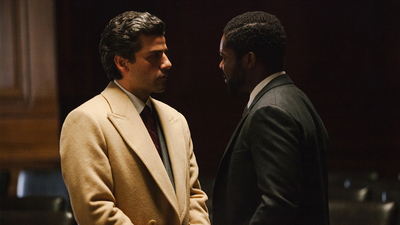
BY ZACHARY WIGON |
Interview: Andrew Bujalski's Leap Off The Cliff With 'Computer Chess'
After making three micro-budget independent films that changed American cinema, Andrew Bujalski has made a fourth micro-budget independent film. But 'Computer Chess' is something entirely different.

The narrative of Andrew Bujalski's beginnings - Funny Ha Ha, innovative micro-budget cinema, the birth of a movement dubbed "mumblecore" - seems like something film history is ready to solidify, regardless of the fact that Bujalski (as well as other filmmakers grouped in with him) take issue with the classification. Regardless of the details of this movement (or non-movement), one thing is certain: Bujalski's first three films depicted twentysomethings navigating life issues and relationships with a subtle deftness and dogmatic attention to realism that were rarely employed in American independent cinema beforehand.
However, movements can only last so long, and Bujalski's fourth feature, Computer Chess, marks a radical departure for the filmmaker - in certain respects. Set in 1980, the film revolves around a tournament of chess-playing software programs that do battle with one another in a quest to see whose computer program plays the game with the greatest skill. Yet far from a work of realism, the picture contains surrealist imagery, idiosyncratic details, and narrative delivery modes that - at times - recall a glitchy computer program itself. Somewhere between the realms of low-budget independent cinema and a kind of dreamlike cyberpunk - William Gibson by way of Salvador Dali - Computer Chess is a highly inventive picture that adds new narrative elements to filmmaking much as Bujalski's debut film did. It's just that these elements are way, way weirder.
I recently had the chance to sit down with Bujalski to talk about his feelings toward technology's encroachment upon human social relations, as well as what it felt like, as an artist, to leap into an unknown style.
Tribeca Film: I was thinking about the maxim that is often used today, that more often we are treating humans like computers and computers like humans. What's your take on that idea?
My wife noticed the other day that - you know, the UPS guy used to be a guy you'd make friends with. He'd drop stuff off at the house and you'd talk with him for a bit. But nowadays, the typical UPS guy knocks on your door, drops off the package, and by the time you open the door they're gone, because there's a computer tracking their movements, ensuring maximum efficiency. They're being controlled by the computer. You don't chat with that guy anymore. He's on the go! That algorithm is maximizing his efficiency, but that lack of conversation is the human cost of efficiency.
A period piece is never really about then, it's always about now.
TF: There's a kind of unacknowledged presumption at the heart of technological progress - all progress must be good.
Yeah. It certainly seems nuts to say all technology is bad, I mean, the wheel was technology, and I'm sure the wheel had some unintended consequences - there always are. That's where it seems doomed to try to stop technology - the best thing you can do is try to keep up with it. Today though technology progresses so rapidly that it seems the culture doesn't have time to work with it and really absorb it, adapt to it. It's not like our moral abilities can keep pace with Moore's law.
TF: The film takes place in the not too distant past, yet from a technological perspective it's the stone age. So that juxtaposition is very telling. What was your interest with respect to highlighting that tension?
That might be a feature that's particular to our times, that thirty-some years ago could seem so distant. I'm not sure that it was like that in previous generations. At the time in which the film is set I was a young child, but I have my hazy childhood memories of it, so it's a time period that's alive for me, in a sense. Because I'm a Luddite a large computer is not hilarious to me in and of itself, but it was exciting to be on set with these objects that I kind of remember, their loud clacking keyboards and whatnot.
You could never have made a movie on an analog video camera back then, even though the camera we shot on was then at the height of its popularity.
But a period piece is never really about then, it's always about now. Whether it's a Civil War movie or a sci-fi movie or whatever, it's a metaphor for today, a jumping off point to talk about today. This movie never could have been made in 1980, for a number of reasons - for one thing, you could never have made a movie on an analog video camera back then, even though the camera we shot on was then at the height of its popularity. We had to wait for cultural standards to get to such a weird place that it was acceptable.
TF: It's also interesting to me, the idea explored in the film of the computers almost being sentient. The computers being treated as if they're human, subtly, unconsciously - the characters of course don't believe the computers are sentient, but sometimes it feels like they're almost acting as if they do.
Well you know, on my way to this restaurant this morning I was late. I got directions from Google Maps, and it told me to turn left on Bowery, and the numbers were going in the wrong direction, and even though I was a bit confused because the numbers were going up and not down, I kept walking and ended up being late because Google Maps had told me to walk that way. And I thought, Google Maps can't be wrong?
There was no imperative toward tastefulness in Computer Chess.
TF: Right, right. So - back to the film - the film has a certain kind of surrealist imagery that it employs, a sort of glitchy surrealism, like the film, at times, feels like a computer program falling apart. What was it like, to take such an artistic departure from your previous work? How did you feel out the new territory?
Well, there was no footing, it was supposed to be a leap off the cliff. That was the fun of it, the joy of showing up to set every day. I've always found production very stressful, but I've never had more fun creatively when we made this movie. The major difference between this and the previous films was that the rule for the previous films was that these were stories that needed to be told by the performances, and the job of the camera and editing was to stay out of their way. The directing was supposed to be tasteful. There was no imperative toward tastefulness in Computer Chess. If there was some distracting idea we had, we did it and that was fun.

TF: So what does it feel like, to take that leap off the cliff? I mean, the reaction to the film has been really positive.
I didn't expect that.
TF: You didn't expect that?
No. I thought I was nailing the coffin closed on my career.
Everybody else on the set has a talent, everybody else is good at something. The director is usually the least talented person on set.
TF: Then why go ahead with the film?
Well, I loved it and I really wanted to make something. After Beeswax, I got married, I had a kid, I bought a house, and I spent the early part of 2011 trying to pull together a much more conventional movie, with some movie stars and more money, a more regular movie. We hit a wall with financing and there was a moment in May of 2011 where we said, okay, this movie's not going to happen this year, but I really wanted to make something. I had this eight page treatment for Computer Chess and I just said, let's try to do this right now. It was an insane thing to take on, I didn't know if it would be coherent at all, and if it wasn't that would've been okay - it was an adventure. It's a perverse irony for me that it may well be - knock wood - it seems like it could be my most commercial film, which was the last thing I thought it would be. So go figure.
TF: So it never got turned into a traditional script?
No. It was my first time working without a traditional script, which really just meant I had to be better prepared. It was a sixteen day shoot, the shortest shoot I've ever done. We had very limited resources. The whole thing was crazy.

TF: When you're shooting a scene without a script, an improvised scene, how do you know when you've got it in the can?
Well, you never know anything. You often find out in the editing room that something you thought was great actually doesn't work, and vice versa. That can be interesting. But you just have to trust your instincts. You know, the director has the strangest job. Everybody else on the set has a talent, everybody else is good at something. The director is usually the least talented person on set. The only thing you do is try to hold the whole thing in your head and know what feels right and what feels wrong. So you just trust your instincts and you say, great, that was exciting, or you say no, that doesn't work, let's try something else. Also, the clock is ticking, it's a sixteen day shoot, so it's like, something has to work. Also, casting is so huge - casting is like a finite marriage. For those weeks or months you are married to your actors, and you accept them the way that you accept your partner. The worst thing you can do is - you know, like, if you wanted, say, Tom Cruise for your movie and you couldn't get him. The worst thing you could do is try to make your actor into Tom Cruise. If you don't have Tom Cruise, that's fine, just work with who you have. So the people on my set are the people I'm in love with, I love what they're bringing to the roles and I'm trying to pull things specific to them out of them for the roles. Most of the job is just getting people to trust themselves.

